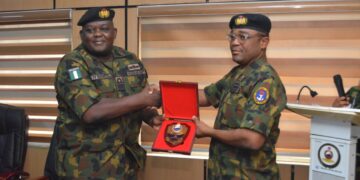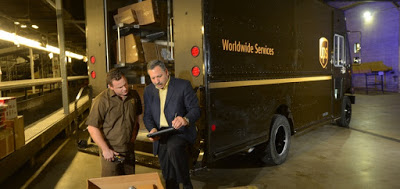Dive
Brief:
Brief:
- UPS will team with a handful of tech
companies — including Microsoft, Accenture, City Tech
Collaborative, and HERE Technologies — for a four-month study in
Chicago on the role delivery trucks play in the city’s traffic congestion,
and to find possible solutions, reports the Chicago Tribune. - In the study, HERE Technologies, which analyzes traffic
data, will find places and times when congestion from delivery trucks
worsens or when gridlock makes delivery more difficult. - A second part of the study will involve a consumer survey to
measure reactions to potential changes in delivery schedules. For example,
if the study finds that a particular time of day for package delivery
creates congestion, the consumer survey will measure how easy it will be
to change delivery times.
Dive Insight:
Studies
have shown that delivery trucks make up a disproportionate shareof
congestion costs relative to the amount of vehicles on the road, a phenomenon
that’s only gotten worse as
more customers turn to online shopping. The rise of contracted delivery that
use personal vehicles rather than large trucks has also put more delivery
traffic on crowded urban streets. A 2017 report from the supply chain
firm MHI projected that urban freight delivery would grow 40%
by 2050, putting a burden on businesses to work on logistics to reduce
congestion impacts.
have shown that delivery trucks make up a disproportionate shareof
congestion costs relative to the amount of vehicles on the road, a phenomenon
that’s only gotten worse as
more customers turn to online shopping. The rise of contracted delivery that
use personal vehicles rather than large trucks has also put more delivery
traffic on crowded urban streets. A 2017 report from the supply chain
firm MHI projected that urban freight delivery would grow 40%
by 2050, putting a burden on businesses to work on logistics to reduce
congestion impacts.
Package
firms have pushed back on the idea that they’re the sole cause of
congestion. Tom Madrecki, director of urban innovation and mobility at
UPS, previously told Smart Cities Dive that
“the actual cause of traffic in cities is single-occupancy personal
vehicles, it is not commercial vehicles.”
firms have pushed back on the idea that they’re the sole cause of
congestion. Tom Madrecki, director of urban innovation and mobility at
UPS, previously told Smart Cities Dive that
“the actual cause of traffic in cities is single-occupancy personal
vehicles, it is not commercial vehicles.”
Companies
have also tried to address their own role by taking steps like installing
storage lockers that require only one stop to drop off multiple packages, or
reaching agreements with ground-level small businesses to deliver multiple
packages there. Some companies are even looking at electric-assist delivery
bikes and delivery handcarts; the startup Nuro is testing a
self-driving delivery vehicle slightly smaller than a sedan.
have also tried to address their own role by taking steps like installing
storage lockers that require only one stop to drop off multiple packages, or
reaching agreements with ground-level small businesses to deliver multiple
packages there. Some companies are even looking at electric-assist delivery
bikes and delivery handcarts; the startup Nuro is testing a
self-driving delivery vehicle slightly smaller than a sedan.
The
Chicago study, however, will give a broader view of how delivery and congestion
feed each other, and how addressing both holistically can benefit consumers.
The study will only look at one city, but the involvement of consumer surveys
should ensure that any changes are widely applicable — and favored — across
the industry.
Chicago study, however, will give a broader view of how delivery and congestion
feed each other, and how addressing both holistically can benefit consumers.
The study will only look at one city, but the involvement of consumer surveys
should ensure that any changes are widely applicable — and favored — across
the industry.
SupplyChain Dive.
Dive
Brief:
Brief:
- UPS will team with a handful of tech
companies — including Microsoft, Accenture, City Tech
Collaborative, and HERE Technologies — for a four-month study in
Chicago on the role delivery trucks play in the city’s traffic congestion,
and to find possible solutions, reports the Chicago Tribune. - In the study, HERE Technologies, which analyzes traffic
data, will find places and times when congestion from delivery trucks
worsens or when gridlock makes delivery more difficult. - A second part of the study will involve a consumer survey to
measure reactions to potential changes in delivery schedules. For example,
if the study finds that a particular time of day for package delivery
creates congestion, the consumer survey will measure how easy it will be
to change delivery times.
Dive Insight:
Studies
have shown that delivery trucks make up a disproportionate shareof
congestion costs relative to the amount of vehicles on the road, a phenomenon
that’s only gotten worse as
more customers turn to online shopping. The rise of contracted delivery that
use personal vehicles rather than large trucks has also put more delivery
traffic on crowded urban streets. A 2017 report from the supply chain
firm MHI projected that urban freight delivery would grow 40%
by 2050, putting a burden on businesses to work on logistics to reduce
congestion impacts.
have shown that delivery trucks make up a disproportionate shareof
congestion costs relative to the amount of vehicles on the road, a phenomenon
that’s only gotten worse as
more customers turn to online shopping. The rise of contracted delivery that
use personal vehicles rather than large trucks has also put more delivery
traffic on crowded urban streets. A 2017 report from the supply chain
firm MHI projected that urban freight delivery would grow 40%
by 2050, putting a burden on businesses to work on logistics to reduce
congestion impacts.
Package
firms have pushed back on the idea that they’re the sole cause of
congestion. Tom Madrecki, director of urban innovation and mobility at
UPS, previously told Smart Cities Dive that
“the actual cause of traffic in cities is single-occupancy personal
vehicles, it is not commercial vehicles.”
firms have pushed back on the idea that they’re the sole cause of
congestion. Tom Madrecki, director of urban innovation and mobility at
UPS, previously told Smart Cities Dive that
“the actual cause of traffic in cities is single-occupancy personal
vehicles, it is not commercial vehicles.”
Companies
have also tried to address their own role by taking steps like installing
storage lockers that require only one stop to drop off multiple packages, or
reaching agreements with ground-level small businesses to deliver multiple
packages there. Some companies are even looking at electric-assist delivery
bikes and delivery handcarts; the startup Nuro is testing a
self-driving delivery vehicle slightly smaller than a sedan.
have also tried to address their own role by taking steps like installing
storage lockers that require only one stop to drop off multiple packages, or
reaching agreements with ground-level small businesses to deliver multiple
packages there. Some companies are even looking at electric-assist delivery
bikes and delivery handcarts; the startup Nuro is testing a
self-driving delivery vehicle slightly smaller than a sedan.
The
Chicago study, however, will give a broader view of how delivery and congestion
feed each other, and how addressing both holistically can benefit consumers.
The study will only look at one city, but the involvement of consumer surveys
should ensure that any changes are widely applicable — and favored — across
the industry.
Chicago study, however, will give a broader view of how delivery and congestion
feed each other, and how addressing both holistically can benefit consumers.
The study will only look at one city, but the involvement of consumer surveys
should ensure that any changes are widely applicable — and favored — across
the industry.
SupplyChain Dive.
































































